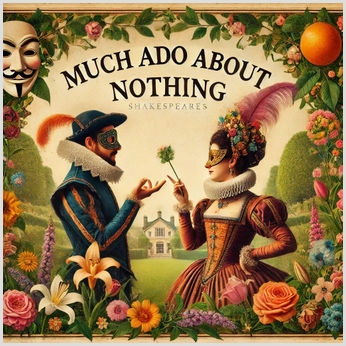William Shakespeare’s play Much Ado About Nothing is famous for its wit, romance and intrigue. Set in the city of Messina in Sicily, the story follows two romantic pairings after the arrival of a group of soldiers: the relationship between Claudio and Hero - nearly destroyed by the villain Don John's accusations - and Benedick (Claudia's friend) and Beatrice (Hero's cousin).
Through this Elizabethan setting and these characters, Shakespeare explores love, deception and genre roles. Many of the observations in social expectations and human behaviour remain relevant today.
This article will explore the major themes of this work by William Shakespeare. It is aimed at GCSE students revising for their English Literature exam. If you need help with your revision, TeachTutti's qualified GCSE English Literature tutors can give you one-to-one support online or in person.
Love and relationships
The theme of love is explored through the contrasting relationships of Claudio and Hero and Beatrice and Benedick. Shakespeare challenges traditional ideas around romance, stressing its complexity and imperfection.
The relationship between Claudio and Hero is presented as perfect. Claudio immediately falls for the beauty and virtue of Hero. However, this love is fragile and Claudio is convinced by Don John that she has been unfaithful. The shaming of Hero shows the danger of focusing on appearances. Hero is passive in her response, her female character reflecting the gender norms in Elizabethan society: women were expected to be obedient and silent. Claudio's accusation shows how quickly love can turn into disdain:
"Give not this rotten orange to your friend" (Act 4, Scene 1)
By comparison, Beatrice and Benedick’s relationship is witty and modern. Their banter and mutual resistance to marriage hide a deep affection that gradually develops. Their love is equal, rooted in honesty and growth. Benedict's quote alludes to this, making their relationship more realistic and enduring:
"I do love nothing in the world so well as you: is not that strange?" (Act 4, Scene 1)
Manipulation and trickery are also present in both relationships. Claudio wins Hero’s affection thanks to Don Pedro’s intervention, while Benedick and Beatrice are tricked into confessing their feelings by their friends. This raised questions about the authenticity of love, as it implies that it is often shaped by external pressures.
Deception and disguise
Deception is a recurring theme that Shakespeare uses both for harm and matchmaking. Characters often mislead each other, blurring the line between reality and illusion. Don John represents the use of deception for harmful intent. He convinces Claudio that Hero has been unfaithful, manipulating Claudio's insecurities. It results in Claudio's rejection of Hero at the altar, causing emotional pain and how trust in a relationship can be fragile when reputation is at stake:
"She knows the heat of a luxurious bed; her blush is guiltiness, not modesty" (Act 4, Scene 1).
Meanwhile, the playful trickery of Beatrice and Benedick's friends has benevolent purposes. Don Pedro, Leonato and others bring comedy to the play when they orchestrate situations where each overhears their supposed love for the other. It forces them to confront their feelings for each other, shown when Benedick moves from scepticism to acceptance of his emotions:
"Love me? Why, it must be requited!" (Act 2, Scene 3)
Disguise is often present in these acts of deception. In the masked ball scene, the characters hide their identities so they can interact in ways they normally wouldn't. Claudio is confused about Don Pedro’s intentions and Beatrice makes playful fun of Benedick while wearing masks. This suggests that appearances can deceive. The use of disguise is also present when Hero feigns her death to restore her honour and mend relationships.
Gender roles and expectations
Gender roles are both reinforced and challenges in Much Ado about Nothing. The play critiques societal norms that cause inequality and celebrates the characters who challenge these conventions.
Hero is shown as the ideal woman of the time: silent, obedient and virtuous. Her father Leonato controls her future and treats her as a commodity during marriage negotiations. Leonato's reaction when her honour is questions shows how a woman's worth in society is tied to her chastity:
"Do not live, Hero; do not ope thine eyes" (Act 4, Scene 1).
After her public humiliation, Hero remains passive and decides to marry Claudio despite his doubts. She shows how little agency women had in Shakespeare's time - even when falsely accused - and the expectation that they would be compliant within society.
Beatrice challenges traditional gender expectations with her sharp wit, independence and disdain for marriage. Her refusal to confirm to societal norms makes her resonate more with modern audiences. For example, Beatrice laments the limitations of her gender after Claudio shames Hero, frustrated that women can't defend their honour:
"O God, that I were a man! I would eat his heart in the marketplace" (Act 4, Scene 1).
Men are also subjected to gender expectations. Claudio is obsessed with Hero's virtue while Benedick is reluctant to marry. It reflects the pressure on men at the time to uphold their honorous and avoid any sign of vulnerability. In contrast with Claudio, Benedick rejects these expectations by choosing love over loyalty to his male friends.
Honour and reputation
The social standing of a person is tied to their public image in the world of Messina. Any damage to this reputation can lead to severe consequences. Shakespeare explores these implications and how honour and reputation affected women and men differently, revealing a double standard in society.
Honour is linked to chastity and obedience for women. Hero is seen as virtuous when she is introduced. When Don John spreads rumours of her infidelity, this reputation is shattered as is her appeal as a bride. Claudio condemns her at their wedding, showing how quickly admiration can turn to scorn when a woman's virtue is questioned. Hero accepts the situation, underscoring that women had little power to defend their honour:
"You seem to me as Dian in her orb, as chaste as is the bud ere it be blown; but you are more intemperate in your blood than Venus" (Act 4, Scene 1)
A man's honour is tied to his alliances and public actions. Claudio shames Hero because he fears lowering his reputation. Leonato prioritised the honour of his family over his daughter, wishing for her death to remove the stain on their name. This shows how honour in Shakespeare's societal often overrides familial love:
"Hence from her! Let her die" (Act 4, Scene 1)
Shakespeare also challenges traditional views of honour. Beatrice stands up for Hero when she demands that Benedick confront Claudio against these accusations. This in itself is absurd when we consider that violence was the main way men could restore honour. Benedick is willing to challenge Claudio, showing a departure from male loyalty and moving towards personal integrity:
"Kill Claudio!" (Act 4, Scene 1)
Wordplay and social grace
Unsurprisingly, Shakespeare doesn't just use language for communication in his play. It is also a tool for humour, deception and social performance. The verbal sparring between Beatrice and Benedick shows their intelligence and affection, bubbling just below the surface of their rivalry. They have a "merry war" of words that is jam-packed with sharp humour and amusing insults. For example, Beatrice shows that she isn't afraid to challenge gender norms when she calls Benedick:
"a very dull fool; only his gift is in devising impossible slanders" (Act 1, Scene 1)
Their entertaining exchanges protect both characters emotionally and they are only vulnerable when tricked by their friends into confessing their love.
Wordplay also reflects the courtly ideal of sophisticated language in Elizabethan society. Don Pedro and Claudio use ornate rhetoric to express their emotions and navigate social situations. Claudio uses overly romantic language to describe Hero, which contrasts sharply with his later scornful accusations. This shows how language can be both uplifting and destructive:
"Can the world buy such a jewel?" (Act 1, Scene 1).
Deception is highlighted through wordplay. Many misunderstandings between the characters are due to overheating or misinterpreting conversations. Shakespeare uses this narrative device to drive the plot. , a narrative device that Shakespeare masterfully employs to drive the plot. The character Dogberry often speaks in malapropisms, when he mistakenly uses a word in place of a similar sounding one. An example is when he means to say "communicate" but instead says "excommunicate", which means to explode an offending member of a religion. This humour language also stresses the importance of clear communication, as his failure to articulate information delays the revelation of Don John’s plot:
"Only get the learned writer to set down our excommunication, and meet me at the jail." (Act 3, Scene 5)
Final thoughts: Much ado about nothing
Much Ado About Nothing mixes humour, romance and social critique. It explores themes including love, deception, honour and genre roles. The play is entertaining and provides an insight into Elizabethan society. Shakespeare often challenges social norms, such as the traditional ideals of love and marriage through the comparison of the relationships of Claudio and Hero with Beatrice and Benedict.
The importance of reputation and social standing highlights how fragile trust is in the relationship between certain characters and the overbearing pressure from society. Deception is used to show the complexities of human interaction. Ultimately, the play remains relevant because Shakespeare addresses serious issues with wit and insight, resonating with audiences.
For further reading, The Royal Shakespeare Company has compiled a list of famous quotes in the play. Bell Shakespeare also has an interesting article on the historical background of the play.
If you need further help revising Much Ado About Nothing, such as key characters and memorising key quotes, consider learning with TeachTutti's experienced English Literature GCSE tutors. All our tutors have an enhanced DBS check and are experienced in guiding students through exams.
This post was updated on 10 Jul, 2025.

